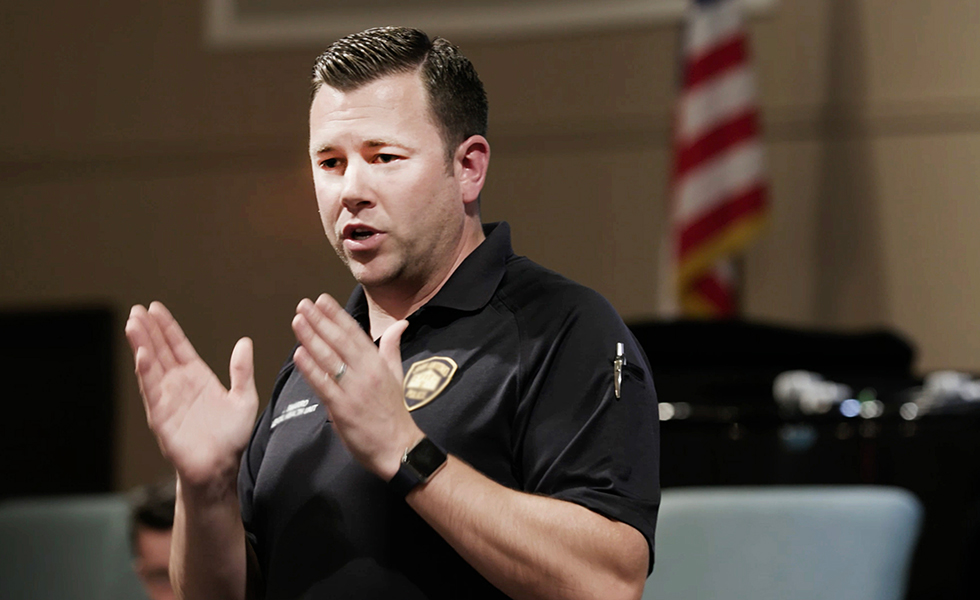It’s the middle of the night, and a skinny young man is slumped on a curb outside a San Antonio strip club. Officer Joe Smarro—dressed casually in jeans, sneakers, and a black polo shirt—approaches him.
“What’s going on, man?” he asks.
“Woke up and didn’t like the reality I’m in,” the man replies.
The encounter wasn’t random. Smarro has been called here by worried family members, who’ve discovered their relative has just purchased a gun and plans to kill himself that night. “All I ever wanted was a family, to work hard, provide for them,” the man says, “but all I do is fuck up.” Smarro nods, then does something unusual: He gets vulnerable. “I could give you an hourlong class on that, brother,” Smarro says. He tells the man that he’s fathered five kids with three women, running from relationship to relationship to try to escape the lingering pain from his abusive childhood. Both men, it turns out, had stepfathers who beat them. “I’ve struggled with suicidal thoughts,” Smarro says. “I see it almost weekly out here, when we’re too late, and it’s like, fuck.” After a few more minutes of talking, the man agrees to let Smarro and his partner, Ernie Stevens, drive him to a psychiatric emergency room.
Everything about this encounter challenges the typical dynamic between a cop and a person in crisis. Smarro wore plainclothes, not an intimidating uniform. Though the young man admitted he had a gun in his car, at no point did the officer draw his or give any orders. And, perhaps most importantly, Smarro revealed his own struggles. The scene reminded me of a video in which the social worker and self-help guru Brené Brown explains the difference between sympathy and empathy. Sympathy is pity, she says, and it only makes things worse; empathy is seeing someone in a deep, dark hole and climbing down to sit beside them.
Variations of this scene play out over and over throughout Ernie & Joe, a new documentary by award-winning filmmaker Jenifer McShane about how the San Antonio Police Department (SAPD) is changing the way cops handle mental health crises. The hour-and-a-half-long film, now streaming on HBO, is hard to watch. On highway overpasses and in dingy apartment complexes, we see real people at their lowest moments, often hearing voices, sobbing, or shaking with fear. The cops also speak candidly about their own trauma, which has been compounded by losing three of their colleagues to suicide within two years. Still, the film offers hope. At least one part of fixing the United States’ broken mental health care system, it argues, is actually pretty simple: Instead of arresting or shooting mentally ill people, listen to them.

This might sound obvious, but for a long time, it wasn’t. As one mental health expert says on-screen, the SAPD’s default response to mental illness used to be “jail, jail, jail.” Nationwide, 75 percent of women and 63 percent of men in local jails have a mental health diagnosis. Those statistics are likely even worse in Texas, which ranks a dismal 48th in the nation on mental health spending—just $40 per person per year. And San Antonio faces extra challenges, including a large veteran and military population and a poverty rate higher than that of any other large U.S. city.
In 2005, in response to severely overcrowded jails, SAPD introduced crisis intervention training for all cadets. Every employee is now required to complete 40 hours of this specialized course, far more than the national average of six. Since 2008 the department has had a mental health unit whose 10 officers, including Smarro and Stevens, are dedicated to such calls. The department estimates that these changes have diverted 100,000 people from jail to treatment.
San Antonio has been lauded as a national success story for these efforts, and Ernie & Joe accepts that narrative uncritically. We see the two officers crisscrossing the city’s sprawling highways in their unmarked black SUV, calmly de-escalating crises and taking people to get help. They hand out their cell numbers to those they aid, call them a few days later to ask how they’re doing, and even make follow-up visits to their homes. The men also spend a lot of time leading trainings for other first responders—arguably their most important work, since their small unit can handle only 5 to 7 percent of the city’s mental health calls. Some cops scoff at what they call “hug-a-thug training,” but Smarro, in particular, seems to be getting through. He urges cadets to listen and empathize before they act, telling them that the vast majority of their interactions will be with “someone who just needs you to show up and give a shit.” In one effective exercise, a trainee tries to hold a conversation while four others shout at him, simulating the terrifying chaos of auditory hallucinations.
Better-trained cops are only one piece of the puzzle, of course. A more complex film might’ve mentioned the people with mental illness—like Jack Michael Ule and Janice Dotston-Stephens—who have died in the Bexar County jail, unable to make bail after being arrested on low-level charges. The filmmakers also could’ve delved into the enormous power of police unions to oppose reforms and protect cops accused of misconduct; San Antonio’s union is especially influential—“a case study in how police build and wield political power,” as the Observer’s Michael Barajas has put it. And there’s the fact that getting access to affordable, reliable mental health care is very difficult, especially if you’re uninsured.
But Ernie & Joe isn’t that kind of film. Its focus is on one-on-one, personal encounters, not systemic change, and that’s when it’s most effective. In an unforgettable scene filmed via dashcam, the two officers talk with a woman who’s straddling a highway bridge, about to jump. “Don’t tase me!” she shouts. Her fear is not unreasonable, especially since she’s black; in 2015, SAPD officers fatally tased Norman Cooper, a black man who was high on meth when his family called for help.
On the bridge, Stevens tries again. “My name is Ernie,” he says. “I don’t trust you!” the woman cries. Other tactics—asking what’s wrong, offering to help—fail, too. Finally, he tries the same thing that worked for his partner in the earlier scene: vulnerability. “You’ve got me scared,” he admits. “I’m very scared right now.” She falls silent. Then, a minute later, she climbs off the ledge. It’s just one person, just one moment. But it’s a start.
If you or someone you know needs help, call 1-800-273-8255 for the National Suicide Prevention Lifeline.
Read more from the Observer:
-
As Port Neches Plant Smolders, Trump Rolls Back Safety Rules for Chemical Plants: After a deadly explosion in the town of West in 2013, Obama implemented stricter safety rules for chemical plants. Trump’s EPA has just undone them.
-
Why I Started a Book Club in the Harris County Jail: Education programs make jails safer and reduce rates of recidivism when people reenter society.
-
Joe Barton Resurfaces with a Blueprint for How to Bail Out the Oil Industry and Worsen Climate Change: As the former Texas congressman prepares to get into the lobbying game, the climate-change denier reflects on how he worked with industry to unleash a runaway drilling boom in the Permian Basin.







